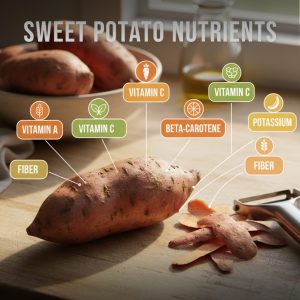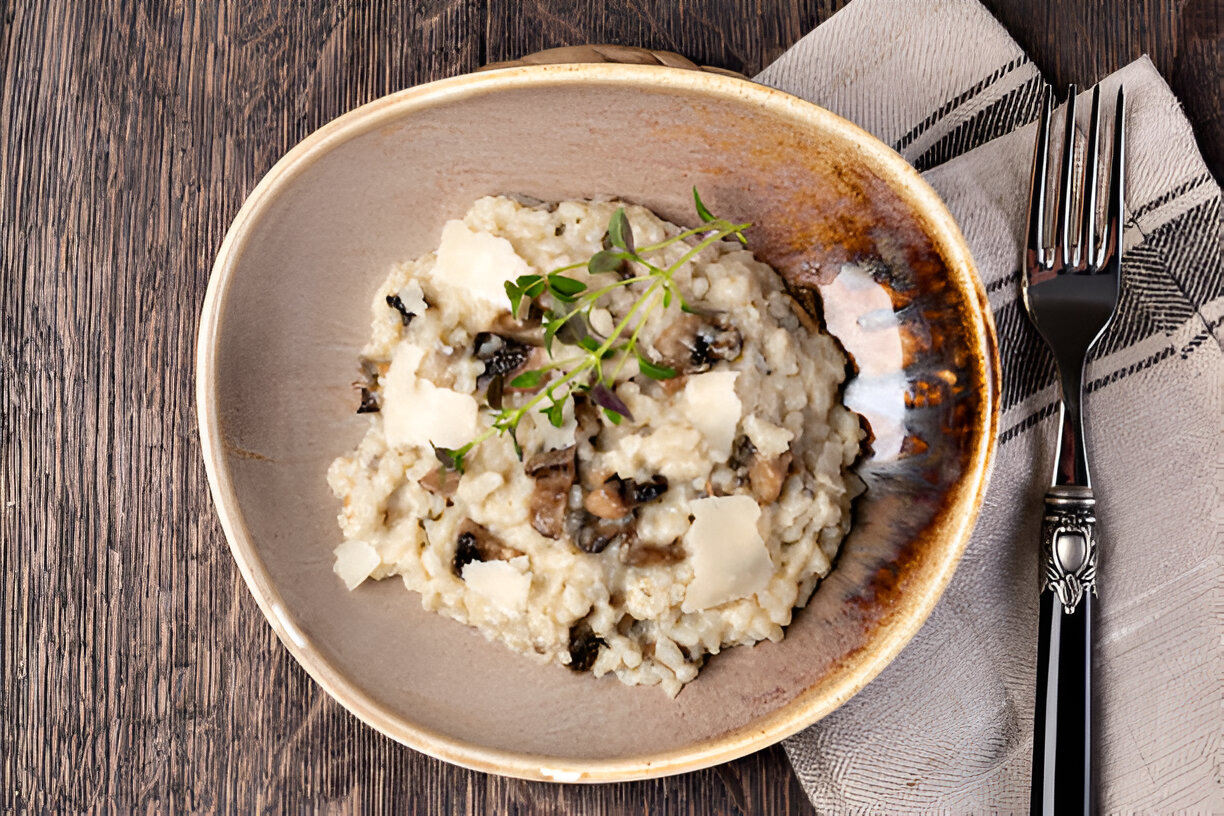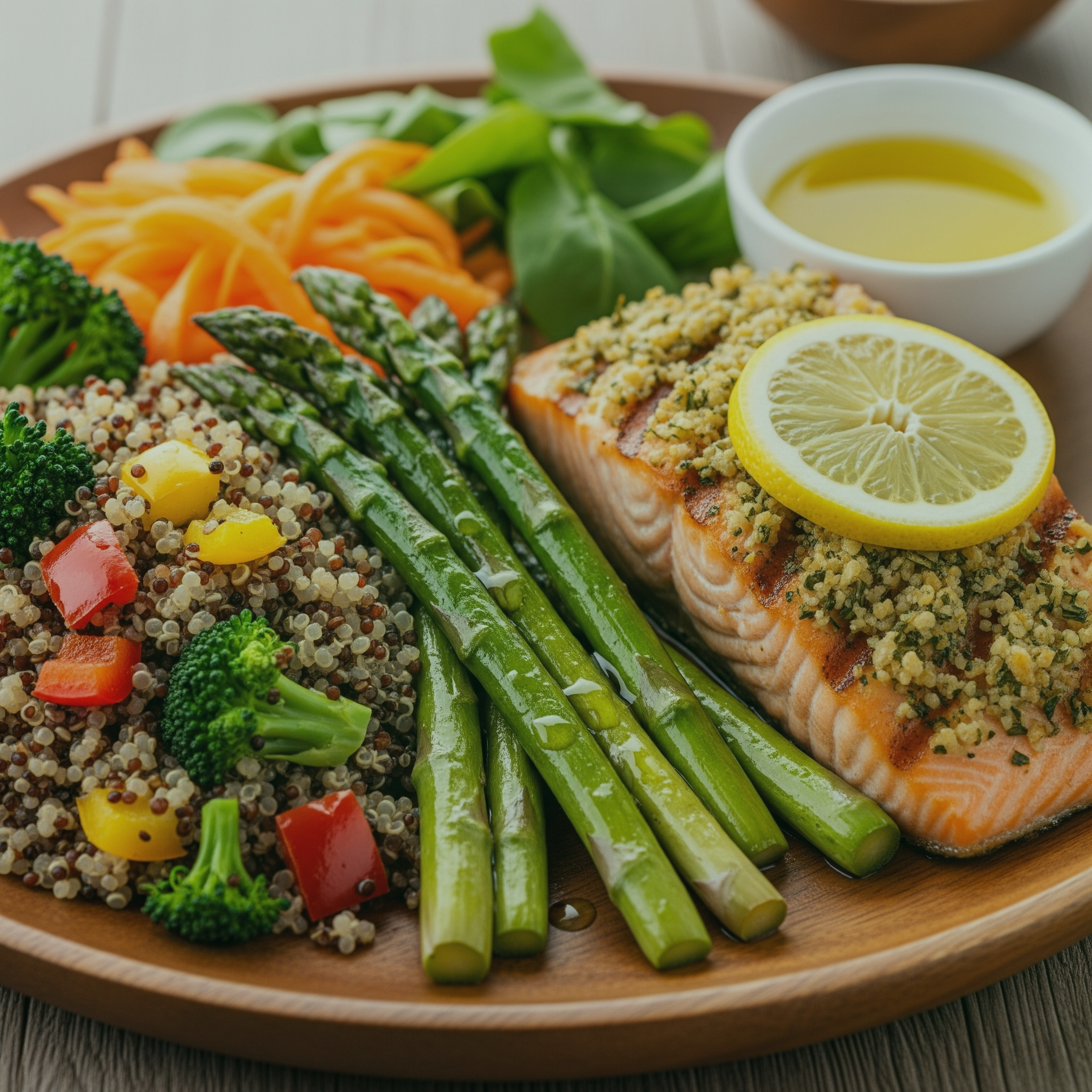In This Article
You’ve likely tasted sweet potatoes before — maybe in a warm holiday dish, or simply roasted with a drizzle of olive oil. But what if I told you that sweet potato nutrition is one of the quiet champions of whole living? Behind their soft sweetness lies a bundle of vitamins, fiber, and deep nourishment for your body and mind. Sweet potatoes are more than a comfort food. They are a beautiful, grounding gift from the earth, asking only to be cooked with care and eaten with joy.
Let’s take a moment to appreciate how they make you feel. There’s something comforting about holding a fork-tender baked sweet potato on a cool day. You’re not just feeding your hunger — you’re giving your body complex carbohydrates, resistant starch, and antioxidants that support better gut health and overall balance. Sweet potatoes contain the kind of energy that sustains you without the crash, helping stabilize blood sugar and support long-term wellness. It’s comfort with purpose, and that’s something to celebrate.
In this cozy space we’re building together, I want you to feel guided, not pressured. You won’t find rigid rules here — only encouragement to explore nourishing foods at your own pace. Sweet potatoes belong here not just because of their nutritional value, but because they remind us that health can be warm, gentle, and even a little sweet. And that’s a path worth walking.
Rooted in Nature: A Glimpse into Sweet Potato Origins

Sweet potatoes have been growing quietly for centuries, rooted in cultures, climates, and kitchens around the world. Unlike white potatoes, which are part of the nightshade family, sweet potatoes belong to the morning glory family. This may seem like a small detail, but it matters — because sweet potatoes offer a different set of nutritional benefits and a more calming energy for your body. They’re not just a trendy health food. They’re a true ancient staple, cherished for both flavor and nourishment.
If you’ve ever noticed the stunning shades of orange, purple, and even white sweet potatoes, that’s nature’s way of showing you just how nutrient-rich they are. Orange fleshed sweet potatoes are rich in beta carotene, which the body turns into vitamin A — essential for eye health, immune function, and good vision. Purple sweet potatoes, on the other hand, carry powerful antioxidants that may play a role in reducing inflammation and protecting against free radical damage. These colorful foods truly are nature’s gentle medicine.
While white potatoes can be part of a healthy diet, sweet potatoes often have the edge when it comes to fiber, resistant starch, and a lower impact on blood sugar. They’re the kind of starchy root vegetables that feel grounding without weighing you down. When you choose sweet potatoes, you’re saying yes to food that not only fills you up, but also feeds your cells and supports your wellness goals. That’s a choice rooted in intention.
What Makes Sweet Potatoes So Sweet (and Powerful)

Sweet potatoes are sweet in a way that feels gentle, not overpowering. Their natural sugars are balanced by fiber and complex carbohydrates, making them a steady source of energy. Unlike highly processed sweets that spike your blood sugar, sweet potatoes offer a slow, sustaining release that keeps you feeling grounded. This is one reason they’re such a beloved food in nourishing diets around the world. They give your body energy that honors your pace and rhythm.
One of the quiet powers of sweet potatoes lies in their resistant starch. This special type of starch isn’t fully broken down in your small intestine — instead, it feeds the good bacteria in your gut. That means every bite of sweet potato is helping build better gut health over time. This connection between food and your internal world is one of the most beautiful parts of whole living. Your meals aren’t just about fuel — they’re part of your healing.
And while their sweetness is a lovely treat, it’s their nutrient density that truly makes them powerful. Sweet potatoes contain key vitamins like vitamin C, beta carotene, and of course, vitamin A. Each bite is a chance to nourish your skin, immune system, and even your eyes. So the next time you enjoy a bowl of roasted sweet potatoes, remember: it’s not just about the taste. It’s about what’s happening within.
READ ALSO: Probiotic Health Supplement Benefits You May Not Know
A Nutrient-Rich Powerhouse for Everyday Living

There’s a quiet strength in food that fuels you without fanfare — and sweet potatoes are just that. With every forkful, they bring a rich combination of vitamins and minerals that support your health in simple yet powerful ways. Most of us don’t need complicated supplements. Sometimes, what we truly need is a warm, baked sweet potato with a sprinkle of sea salt and a drizzle of olive oil.
Here’s a closer look at what you’re getting when you eat sweet potatoes:
- Vitamin A — supports eye health, cell growth, and immune system strength
- Vitamin C — helps with iron absorption and supports skin healing
- Beta carotene — acts as an antioxidant, preventing free radical damage
- Potassium and manganese — key for blood pressure balance and bone health
- Fiber and resistant starch — great for digestion and blood sugar support
Sweet potatoes offer this kind of nourishment with little fat and only moderate calories. They’re a deeply satisfying food, especially when prepared with wholesome ingredients. And while the world of nutrition can sometimes feel noisy and overwhelming, this root vegetable whispers: “You’re doing just fine.” It gives without demanding. It nourishes without judgment.
Including more sweet potatoes in your meals doesn’t require a total diet overhaul. A simple swap here, a roasted wedge there — these small changes have a big impact over time. Because real wellness isn’t about extremes. It’s about choosing foods that love you back.
Orange, Purple, and Everything in Between

The color of sweet potatoes isn’t just beautiful — it’s meaningful. Those vibrant hues signal the presence of powerful antioxidants and essential nutrients. Orange fleshed sweet potatoes are especially rich in beta carotene, which the body converts into vitamin A. This single vitamin alone plays a major role in your overall health, especially your skin, immune system, and eye health. With each warm bite, you’re getting far more than flavor.
Purple sweet potatoes bring something different to the table. Their deep, rich tone reflects a high concentration of antioxidants, including phenolic acids. These compounds help with reducing inflammation and protecting the body from free radical damage. Some studies, including animal studies, have shown their potential in fighting oxidative stress and even slowing the growth of cancer cells. It’s amazing what a naturally colorful food can offer when you really tune in.
And yet, sweet potatoes don’t shout about their nutritional benefits. They simply show up in your kitchen, ready to be boiled, baked, mashed, or sliced. No labels, no stress. Just vibrant, grounding food. This is nature’s way of supporting your whole self, with nutrients wrapped in color and comfort.
Sweet Potatoes and Your Whole Body Health

When you think of health, it’s easy to focus on numbers — calories, grams of protein, percentages on a label. But real health is about how you feel in your body, how your skin glows, how steady your energy remains throughout the day. Sweet potatoes support this kind of deeper wellness. From your gut to your skin to your immune system, they work gently in the background to help you thrive.
Vitamin A plays a big role here. It supports cell growth, helps prevent night blindness, and strengthens immune function. Add to that the antioxidant activity of beta carotene and vitamin C, and you have a food that’s working hard to reduce free radical damage and protect your cells. That’s the kind of support your body needs — calm, steady, and consistent.
Sweet potatoes can also support blood pressure thanks to their potassium content, and may even aid weight loss due to their fiber and resistant starch. They help you feel full and satisfied without excess fat or sugar. Whether you’re eating to support your immune system, your digestion, or just your mood, sweet potatoes bring a quiet, nurturing presence to your plate. They’re here for your whole self — not just your diet.
READ ALSO: Mochi Healthy Treat With Surprising Nutrients
Sweet Potatoes in the Kitchen: Easy, Nourishing, Versatile

In your everyday kitchen, sweet potatoes are one of the simplest, most forgiving foods you can cook. Whether you like them boiled, baked, or roasted, they adapt beautifully. Roasting brings out their natural sweetness, especially when paired with a bit of olive oil or butter. Baking them whole, until they’re fork tender, is a hands-off way to prepare a satisfying side. And boiling sweet potatoes until soft gives you the perfect base for mashes, soups, or nourishing bowls.
If you're looking for something even more comforting, try making sweet potato puree. Just peel, cube, and boil the sweet potatoes until soft, then blend or mash them until smooth. Add a pinch of sea salt and a swirl of sour cream or a little plant-based milk, and you’ve got a cozy, nutrient-rich addition to your meals. You can also fold it into baked goods like muffins, pancakes, or even brownies for a naturally sweet and vitamin-rich twist. This is food that feels good going down — and does good once it’s there.
What makes sweet potatoes shine is their simplicity. You don’t need hours in the kitchen or complicated ingredients. A single roasted sweet potato, served warm with your favorite toppings, can be both satisfying and nourishing. When life feels full, sweet potatoes remind you that wellness doesn’t have to be fancy. It just needs to feel good, taste good, and nourish your body from the inside out.
How Sweet Potatoes Elevate Gut, Skin, and Mood

Sweet potatoes have a way of working from the inside out. Their nutrients support your gut health, help your skin glow, and even play a role in steadying your mood. This is thanks to their fiber, antioxidants, and a blend of resistant starch that feeds the good bacteria in your digestive system. That support creates a ripple effect through the rest of your body. When your gut is happy, you often feel it in your energy, your skin, and even your sleep.
Sweet potatoes are also rich in essential minerals like dv potassium, dv manganese, and dv copper. These nutrients are gentle yet powerful, helping regulate blood pressure, protect your cells, and support collagen production for skin. They’re a natural way to give your body what it needs without overwhelm. Eating sweet potatoes regularly helps fill in the quiet gaps in your nutrition — the ones that affect your glow, your digestion, and your overall ease. It’s slow, steady support you can feel over time.
It’s not just about fiber or vitamins, though. It’s about how food makes you feel. Sweet potatoes contain nutrients that calm inflammation, balance blood sugar, and support regular digestion — all of which help you feel more at home in your body. When food nourishes your body and spirit at once, that’s what we call whole living.
From Comfort to Clinical: Backed by Science

Sometimes the most comforting foods are also the most powerful. Sweet potatoes are a perfect example — they taste like a warm hug, but they’re also backed by science. Modern research, including work by experts like jaime rodríguez c, tian b, lópez yerena a, and riley ck, shows that sweet potatoes offer a wide range of protective nutrients. These include antioxidants that support your immune system and help in reducing inflammation throughout the body. What may feel like simple comfort food is quietly doing something important for your health.
One of the standout benefits of sweet potatoes is their protective effect against free radical damage. That damage can harm your cells over time and is linked to aging, chronic illness, and even cancer cells. But sweet potatoes, especially the purple sweet potatoes and orange varieties rich in beta carotene, help fight that damage with natural compounds. These antioxidants work gently, like tiny helpers moving through your body to clean up and repair. Their effect may not be loud or instant, but it is lasting.
Sweet potatoes also carry a high concentration of vitamins like vitamin A, vitamin C, and vitamin B6. These nutrients support everything from immune strength to healthy skin and brain function. So while your tastebuds enjoy every bite, your body is soaking up the goodness. Sweet potatoes prove that the best foods are often the ones that feel the most familiar and comforting.
READ ALSO: Lentil and Sweet-Potato Stew – Whole Living Eat Well
Why Sweet Potatoes Belong in Your Everyday Diet

There’s something special about foods you can enjoy often — without guilt, without stress, and with full-body benefits. Sweet potatoes belong in your everyday diet, not just as a holiday treat. They’re easy to add to nearly any meal and pair well with both sweet and savory dishes. Even small changes, like swapping white potatoes for sweet potatoes once or twice a week, can bring more vitamins and minerals into your daily rhythm. With every bite, you’re choosing food that feeds more than your hunger.
Here are a few simple ways to bring sweet potatoes into your routine:
- Slice and roast them for easy meal prep bowls
- Mash them with a little butter and sea salt as a cozy side
- Dice and toss them into soups or stews for natural sweetness
- Add them to your breakfast — think sweet potato hash or pancakes
- Use sweet potato puree in muffins, smoothies, or oatmeal
Sweet potatoes contain the kind of energy and fiber that helps keep blood sugar stable, making them perfect for busy mornings or calm, grounding dinners. They’re rich in vitamins, support immune function, and offer a balanced way to feel satisfied without eating too much fat. It’s not about perfection. It’s about presence — showing up for your health in small, joyful ways.
Let these colorful vegetables remind you that food can be simple and still full of meaning. With each dish, you’re building more balance, more calm, and more connection with your body.
The Whole Living Way: Intentional Food with Purpose

At the heart of Whole Living is a belief that food should nourish more than your body — it should nourish your life. Sweet potatoes are a perfect match for this mindset. They’re unpretentious, easy to cook, and deeply nurturing. When you prepare them with care and eat them with presence, they become more than a vegetable. They become a reminder that wellness doesn’t have to be complicated.
Eating with intention means choosing foods that serve your overall health, not just your cravings. Sweet potatoes are grounding, comforting, and rich in nutrients that support your everyday well-being. They help reduce stress on your system, offer lasting energy, and support your immune system, skin, and digestion all at once. Choosing them often isn’t about being “good” or “healthy” — it’s about listening to what your body truly needs. And more often than not, it needs warmth, softness, and a little sweetness.
In a world full of diet noise and quick fixes, sweet potatoes bring you back to what’s real. They invite you to slow down, cook something simple, and connect with your food. That’s what Whole Living is really about — not chasing perfection, but creating peace, one bite at a time.
Final Takeaway: Nourish with Love, One Sweet Bite at a Time
You don’t need to change everything overnight. Real nourishment begins with one thoughtful choice, one small shift, one sweet potato on your plate. When you choose foods that comfort your body and support your health, you’re choosing a path that honors your whole self. You’re not just eating better — you’re living with more balance, more presence, and more joy.
Sweet potatoes are here for you. Whether you enjoy them roasted with herbs, mashed with a swirl of butter, or blended into a batch of cozy baked goods, they bring warmth and wellness to your daily rhythm. They support your immune system, protect your cells, and help you feel steady from the inside out. That’s a lot of power in something so simple.
Remember, wellness isn’t about extremes. It’s about creating moments of care — small, nourishing steps that lead to a more vibrant life. Sweet potatoes are one of many foods that can guide you there, gently and deliciously. Let each bite be an act of kindness toward your body and your journey.
UP NEXT: Egg White Nutrients: Small Food, Big Benefits
Explore More
Endrias, M., Negussie, T., & Gulelat, D. (2016). Review on the nutritional composition of orange‑fleshed sweet potato as a second staple food crop. Journal of Food Science and Nutrition, 4(2), 27‑36.
Grebla‑Al‑Zaben, B., Babalau‑Fuss, V., Biris‑Dorhoi, S. E., Talos, I., & Tofana, M. (n.d.). A review of the composition and health benefits of sweet potato (Ipomoea batatas). Retrieved from https://pdfs.semanticscholar.org/f9d1/d92bafd51f3b4d78a26ca7f58c023b2870e8.pdf
Kim, S., & Fenech, M. F. (2018). Nutritionally recommended food for semi‑ to strict vegetarian diets based on large‑scale nutrient composition data. arXiv. https://arxiv.org/abs/1803.04915
Low, J. W., et al. (2007). The potential of orange‑fleshed sweet potato to improve vitamin A intake in developing countries. Food and Nutrition Bulletin, 28(2_suppl2), S227‑S242.
Senior, N. (2020). A review of the scientific literature on the health and nutrition of sweetpotato (PW20001) [Final report]. Hort Innovation. Retrieved from https://www.horticulture.com.au/globalassets/laserfiche/assets/project-reports/pw20001/final-report–pw20001.pdf
Wang, Z., Gao, M., Kan, J., Cheng, Q., Chen, X., Tang, C., Chen, D., Zong, S., & Jin, C. (2024). Resistant starch from purple sweet potatoes alleviates Dextran sulfate sodium‑induced colitis through modulating the homeostasis of the gut microbiota. Foods, 13(7), 1028. https://doi.org/10.3390/foods13071028
Wang, L., & Stoner, G. D. (2008). Review on the potential health benefits of sweet potato (Ipomoea batatas [L.] Lam). International Journal of Food Science & Technology, 58(6), 2866‑2875. https://doi.org/10.1111/ijfs.16447
Zhang, L., et al. (2022). Comparative analysis of nutrients, phytochemicals, and minerals in sweet potato roots of different flesh colours. Foods, 13(22), 3636. https://doi.org/10.3390/foods13223636





















